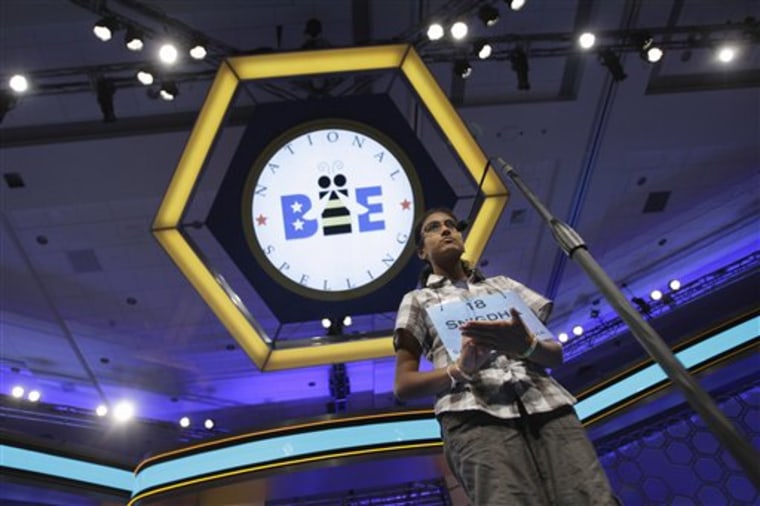Forty-one youngsters have advanced to the semifinals of the Scripps National Spelling Bee.
The 41 youths had the highest scores after Wednesday's early rounds.
The semifinals take place Thursday morning. The finals will be held Thursday night, broadcast in prime time for the sixth consecutive year.
The winner will receive more than $40,000 in cash and prizes.
The top returning finishers from last year are still in the running. Joanna Ye is a 14-year-old eighth grader from Carlisle, Pa., who tied for fifth place last year.
Laura Newcombe, a 12-year-old eighth grader from Toronto, also tied for fifth in 2010. She is trying to become the first Canadian to win the bee.
For the most part, the second round of the bee ran like a well-oiled machine, with youngsters rattling off the letters to words like "usufructuary" and "febrifugal" without a hitch.
Then there was Skye Merriam, the rare speller who had the misfortune of hearing a word she didn't know — one more familiar to sore-muscled adults than bright and lively kids. The 11-year-old sixth grader from Driggs, Idaho, was given the pain reliever "ibuprofen" and guessed "ibuprofine." She made a sad, slow walk after the round to find her parents, who offered hugs and comfort and managed to coax her into a halfhearted fist bump.
The oral rounds of the 84th edition of the bee began Wednesday morning, with 275 spellers ages 8 to 15 from across the United States and around the world competing. The scores were to be combined with Tuesday's written test to determine who advances to the semifinals Thursday morning.
The finals will be held Thursday night, broadcast in prime time for the sixth consecutive year. The winner receives more than $40,000 in cash and prizes.
All but 38 of the competitors to approach the microphone in the second round spelled their word correctly, many of them after asking the usual questions about definition, language of origin and pronunciation. Among the more amusing words: "harrumph" and "ballyhooed."
One of the most suspenseful moments was provided by Marcus Glenn Tecarro of Loves Park, Ill., who was clearly stumped by the word "ineluctable," an adjective that means something that's not to be avoided or escaped.
The 14-year-old eighth grader paused and paused again. Pronouncer Jacques Bailly used the word in a humorous sentence, connecting it to tax evasion, causing many in the audience to laugh. When Marcus spelled the word correctly, he let out a sigh and feigned falling over backward in relief.
Arvind Mahankali from New York punched the air when he correctly spelled "melange," while Caleb Miller of Monroe, La., was one of several who used the tried-and-true method of writing the word on his hand as he spelled it. Surjo Bandyopadhyay of Lusby, Md., grabbed the microphone as if he were going to sing instead of spell; he initially looked perplexed by the medical word "lidocaine," then blurted out "I got it" and spelled it with a smile.
Nerves compete with aptitude under the bright lights of the stage, and the spellers who have been here before have the advantage of knowing the routine. Two-time participant Antony Joseph of Fairmont, Minn., greeted Bailly with a "Yo" when approaching the microphone and comfortably spelled "deceptious."
The top returning finishers from last year had no problems with their words. Joanna Ye, a 14-year-old eighth grader from Carlisle, Pa., had a warm "Hi, Dr. Bailly" greeting for the pronouncer before spelling "wickiup," a type of Native American hut.
Joanna tied for fifth in 2010, as did Laura Newcombe of Toronto, a 12-year-old eighth grader who is trying to become the first Canadian to win the title. Laura handled the word "equinoctial" with ease.
Laura's top Canadian rival, Veronica Penny from Rockland, Ontario, seemed to have some trouble with the proper noun "Fauntleroy." The 13-year-old seventh grader pronounced the word several times amid long pauses before spelling it very slowly — and correctly.
